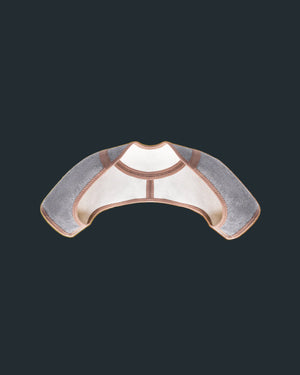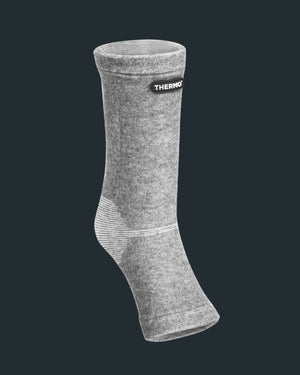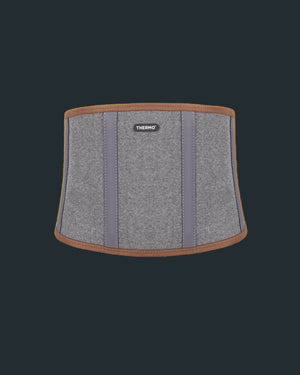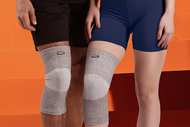Suffering from elbow pain can disrupt a good night's sleep, leaving you searching for remedies. However, you can enjoy restful nights and pain-free days by learnin...
Suffering from elbow pain can disrupt a good night's sleep, leaving you searching for remedies. However, you can enjoy restful nights and pain-free days by learning how to stop elbow pain when sleeping.
This article outlines practical measures, from utilizing innovative recovery garments to adopting sleep positions that reduce discomfort. Don’t forget that you can enhance the recovery of all of your joints by utilizing Thermo Recovery Wear.
What Causes Elbow Pain When Sleeping?
Causes of elbow pain while sleeping can range from bad sleeping positions to actual medical conditions. Here are some of the causes:
Improper Sleeping Position
Resting with your arm bent in an awkward position can place undue strain on the elbow joint and surrounding muscles, leading to discomfort or pain in the affected arm.
Continuous pressure on the elbow while sleeping, especially on a hard surface, can cause the joint to become sore. If you’re as side sleeper, pay attention to where your bottom arm is resting when you go to bed.
Sleeping With Tennis Elbow
Tennis elbow, or lateral epicondylitis, is a condition you may be suffering from if you’re been using your arms a lot for work or sports. The symptoms include pain in the outer part of the elbow, typically resulting from overuse of the forearm muscles.

This repetitive strain injury can be particularly bothersome at night. Sleeping with your arm straight or lying on the affected side can aggravate your symptoms, leading to poor sleep.
Modifying your sleeping position and providing adequate support, like a few pillows to help rest your arm in a neutral position, can help reduce tennis elbow pain. You may also use a tennis elbow brace to help with the chronic pain.
Cubital Tunnel Syndrome
This condition occurs when the ulnar nerve, which passes through the cubital tunnel (a small groove on the inside of the elbow), becomes compressed or irritated. Have you ever hit your “funny bone” and felt that uncomfortable vibrating sensation? This is the same spot!
Symptoms of cubital tunnel syndrome can worsen at night when the elbow is bent for prolonged periods during sleep, but a routine of stretches for your wrist and elbow before bed can help. If you’re not feeling better with stretching, you may need to see a physical therapist for this one.
Tendonitis
Overuse of the elbow can lead to inflammation of the tendons, known as tendonitis. This inflammation can cause pain that becomes more noticeable when lying down and relaxing because daytime distractions go away. Without distractions, your awareness of pain in your elbow increases.
Osteoarthritis
Osteoarthritis is a degenerative joint disease that can affect the elbow, causing the cartilage to wear away and result in pain. Pain from arthritis might intensify at night due to the inactivity of the joint, which reduces joint lubrication and circulation.
Bursitis
The elbow contains small, fluid-filled sacs called bursae that cushion the bones, tendons, and muscles around the joint. Inflammation of a bursa, known as bursitis, can cause pain and discomfort that may be more noticeable when pressure is placed on the elbow during sleep.
Old Injuries
Previous elbow injuries, such as fractures, sprains, or dislocations, can cause residual pain and discomfort that become more pronounced at night. However, it’s easy to think that old injuries are the cause of your pain when it’s actually something different, so always talk to a professional if you’re unsure.
Nerve Entrapment
Conditions like cubital tunnel syndrome can affect nerves at the elbow, leading to pain or numbness, while nerve irritation in the neck can also cause referred pain in the elbow. This can be exacerbated at night due to the extended periods of elbow flexion and the potential for tugging on nerves in certain sleeping positions.
Medical Conditions
Certain medical conditions, such as rheumatoid arthritis or gout, can cause elbow pain. These conditions often get worse at night due to changes in chemical balances, leading to increased stiffness and discomfort.
Maintaining a neutral position, using supportive cushions, or wearing a brace might help alleviate elbow pain during sleep. If the pain persists, it is advisable to consult a healthcare professional for a proper diagnosis and treatment plan.
How to Stop Elbow Pain When Sleeping
Here are a few approaches you can take to control your elbow pain while sleeping:
1. Utilize Thermo Recovery Garments
Thermo™ Lite Recovery Elbow Sleeves are designed to help reduce elbow pain during sleep by enhancing blood circulation and promoting the natural healing process.
The sleeve is constructed from a blend of materials, including "Black Diamond" bamboo charcoal, which, when warmed by body heat, stimulates cellular vibrations.
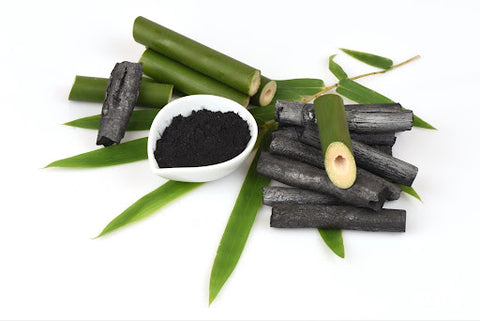
These cellular vibrations boost blood flow, helping to enhance recovery through reducing pain, inflammation, and swelling.
2. Maintain a Neutral Arm Position
Keeping the elbow in a neutral position while sleeping can help minimize stress on the joint and surrounding tissues. Using pillows to support the arm and maintain a pain-free position can reduce pain.
3. Use Appropriate Pillows
Placing pillows around the elbow can offload pressure and help keep the joint in a comfortable position throughout the night. A pillow under the arm or elbow can also elevate the joint, which may help reduce tension in your shoulder.
4. Gentle Night Time Stretching
Gentle stretches before bed can improve flexibility and decrease the stiffness that often accompanies elbow pain. However, it is important to perform these stretches with care to avoid overstraining the muscles and tendons.
5. Apply Ice or Heat Before Bed
Using ice can help reduce inflammation and numb sore tissues, providing relief from pain. Alternatively, heat can relax muscles and increase blood flow. Applying ice or heat as appropriate before bedtime may decrease pain during sleep.
6. Consider Over-the-Counter Medication
Nonsteroidal anti-inflammatory drugs (NSAIDs) can help manage pain and reduce inflammation. Taking these medications as directed by a healthcare professional before sleep might provide overnight pain relief.
7. Practice Good Sleep Hygiene
Establishing a consistent sleep routine and ensuring a comfortable sleep environment can improve the quality of rest, which may indirectly help alleviate pain by promoting better overall recovery. Some examples of good sleep hygiene include silencing your phone, wearing an eye mask, and using a humidifier.
8. Consult a Healthcare Professional
If elbow pain persists despite home remedies and self-care strategies, consulting a healthcare professional is essential to determine the underlying cause and appropriate treatment. Additional therapies, such as physical therapy or medical interventions, may be necessary.
Final Words
Many factors can cause elbow pain at night. Some of them are easy to handle, while others may require a few adjustments or even a doctor’s visit.
Adopting these strategies can significantly reduce elbow pain at night. Rest easier knowing that solutions like the Thermo™ Lite Recovery Elbow Sleeve and proper sleep hygiene are within reach.
Discover more products at Thermo Recovery Wear.

